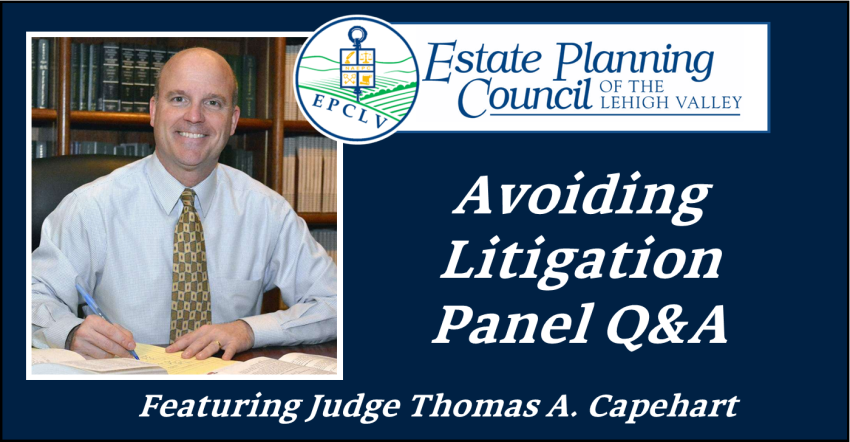Avoiding Litigation Q&A Panel
Date: Thursday, February 19, 2026
Time: 1:30pm - 5:00pm
Location: Barristers' Club Allentown
Speaker: Judge Capehart & Panel

Join us for a Q&A panel discussion featuring Judge Thomas A. Capehart, of Lehigh County Orphans' Court, to learn of the estate planning and administration issues that land clients in litigation. Panelists will discuss the common planning mistakes that lead to litigation and how to avoid them.
POAs:
- Fiduciary litigation. Many of us have seen a rise in clients who are looking to sue or remove an Agent under POA. While there are many unethical scenarios that lead to removal of an Agent under POA, what type of conduct does the Court deem to be a breach of fiduciary duty?
- If an Agent does commit a breach of their duty and is removed as Agent, what alternate safeguards is the Court authorized to put in place? (court appointed guardian, appointment of successor agent named in POA, etc.)
- Often times the Agent’s unethical or improper conduct is first reported to a local Agency on Aging for investigation. How much weight are these investigations given during a lawsuit for removal of the Agent?
- Does appointment of co-Agents limit the possibility of fiduciary litigation? In what type of scenarios would appointment of co-agents create potential issues?
- Capacity issues. Due to the nature of the powers being granted in a POA, can you discuss the difference in the standard of capacity of a Will versus a POA and how practitioners can take caution when preparing these documents for a client whose capacity may be questionable?
Trusts:
- Termination or dissolution of trusts. There are many instances where various trusts can and should be used as a tool to preserve an inheritance, limit estate taxes, or provide for charitable causes. While the current federal estate tax exemption is at $13,990,000 per individual, this figure was much lower in prior generations. As a result, spousal credit shelter trusts were heavily marketed and used by estate planners during the 1990’s and early 2000’s. Many of those clients never updated their plans in accordance with the numerous tax law changes that took effect. As a result, many adult children who are now caretakers for their aging parents are left with irrevocable trust instruments that prohibit or limit their ability to utilize mom or dad’s assets for their care. Can you speak to how often families are forced to seek Court approval or authorization to dissolve trusts that no longer serve the purpose they intended? What grounds does the Court require for termination of such trust agreements?
- Further federal estate tax changes may come in 2026 as the tax cuts and jobs act is set to expire. If not renewed, the exemption is slated to be cut in half. Accordingly, we may potentially see a rise in use of spousal credit shelter or other types of trusts. What precautions can practitioners take in order to avoid using potentially unnecessary trust agreements, or having those agreements terminated.
Wills:
- Contests. Many of our audience members are estate planning attorneys who are very well familiar with the grounds for invalidating a Will such as incapacity, fraud, undue influence, and the steps necessary to avoid a potential Will contest, such as following proper execution requirements. Are Will contests often seen in your court room and what types of steps are most often missed by practitioners to ensure that their client’s Will is safeguarded from a contest?

